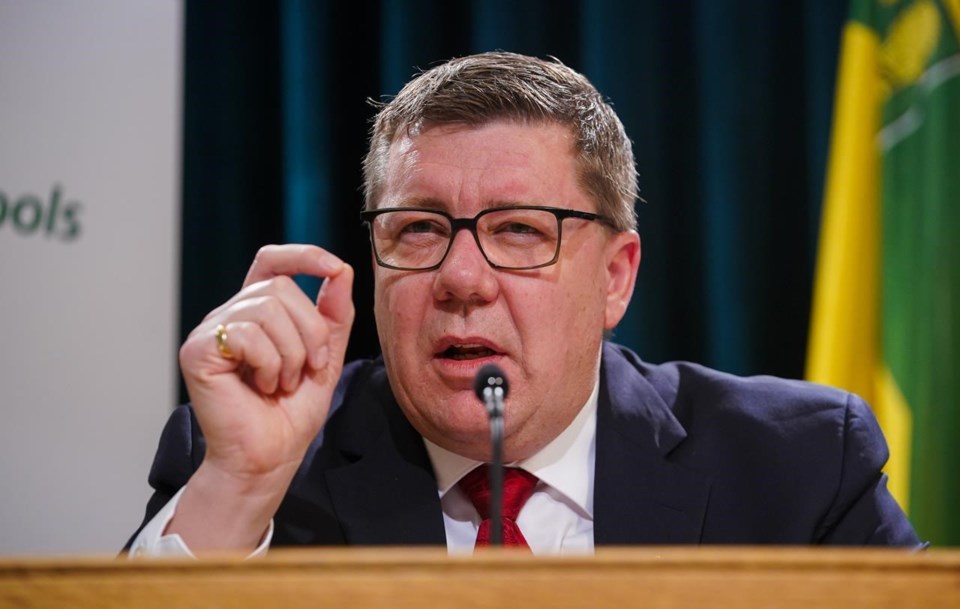OTTAWA — Prime Minister Justin Trudeau accused conservative politicians across Canada, including premiers, of lying to Canadians about the carbon price.
Trudeau's government is buckling as attacks mount against carbon pricing and voters increasingly side with politicians who say the policy is making their lives less affordable.
Most premiers and the federal Conservatives want the Liberals to cancel Monday's scheduled increase of the carbon price by $15 per tonne, adding 3.3 cents to a litre of gasoline and 2.9 cents to a cubic metre of natural gas.
The carbon rebates sent to households every three months are also being adjusted in parallel to the carbon price itself.
Political leaders who criticize the policy are failing to acknowledge and inform Canadians about those rebates, which are meant to offset costs to consumers, Trudeau said. Households that lower their fuel use save money, but their rebate amounts are unaffected.
"Conservative premiers across this country are misleading Canadians, are not telling the truth," he said.
"Eight out of 10 families across the country in federal backstop jurisdictions make more money with the Canada Carbon Rebate than it costs with the price on pollution."
The "backstop" is the federal pricing system, which applies in every jurisdiction that does not have an equivalent pricing system of its own. Currently, British Columbia, Quebec and Northwest Territories do that, while all other provinces and territories use the federal consumer levy.
Trudeau also accused Conservative Leader Pierre Poilievre of blocking legislation that would double the rebate top-up for rural Canadians.
His comments at a press conference in Vancouver came the day after he wrote to critical premiers suggesting they haven't come up with a viable alternative — but is all ears if they do.
They also came as Saskatchewan Premier Scott Moe was pressing his case against the carbon price to a House of Commons committee, the first of three premiers who will do so this week.
Moe said he believes in climate change and that emissions need to go down. But he said pricing pollution is not the way to do it.
"The goal is not for the big polluters to pay, the goal is for them to emit less," he said, bristling a little during an exchange with NDP MP Alexandre Boulerice.
"How is it we shouldn't make big polluters pay?" Boulerice demanded in French, accusing Moe of believing that "giant vacuum cleaners" will suck emissions out of the sky to solve climate change.
Moe said Saskatchewan's industry and farmers have lowered their emissions and are displacing products overseas that have a higher carbon footprint.
"We are not climate laggards," Moe said.
He insisted the carbon price makes it harder for families and businesses to lower their emissions.
The antagonistic nature of the debate was on full display at the committee, which spent almost as much time arguing about whether Moe should have been there at all as it did hearing what he had to say.
Liberal, NDP and Bloc Québécois MPs accused the Conservatives, who chair the committee, of circumventing other members and inviting Moe to speak at a meeting that had nothing to do with carbon pricing.
Conservative chair Kelly McCauley said he invited Moe and other premiers because they had asked to speak to the finance committee, which has refused them.
Alberta Premier Danielle Smith and New Brunswick Premier Blaine Higgs are both scheduled to appear at the committee Thursday.
Smith said Wednesday her province has a plan to be carbon neutral by 2050 by cutting major industrial emissions. She pointed to a Canadian Climate Institute report last week which said the carbon price on heavy industry is doing more to cut emissions than the consumer levy.
The consumer levy is still expected to cut between 19 million and 22 million tonnes of emissions annually by 2030, which could amount to about 10 per cent of what Canada aims to cut over that same timeline.
Smith herself is under fire in Alberta for hiking the provincial gas tax five cents a litre on April 1, more than the 3.3 cents being added by the carbon price and without any accompanying rebate.
Smith defended the move, which reinstates a tax that had previously been slashed, as necessary to pay for roads.
A similar attack was launched against Higgs in New Brunswick after the province's utilities board approved nearly a 13 per cent hike to electricity bills as of April 1.
Provincial Liberal Leader Susan Holt called for an emergency debate in the provincial legislature about the hike.
"If Premier Higgs was focused on New Brunswickers instead of obsessing with Ottawa, he would be doing his part to make life more affordable for you," Holt said in a social media post.
Ontario Liberal MP Francis Drouin also challenged Moe on why, if he's so concerned about the cost of living, he hasn't cut provincial taxes.
Saskatchewan already exempts natural gas used for heat from provincial sales taxes.
This report by The Canadian Press was first published March 27, 2024.
Mia Rabson, The Canadian Press



